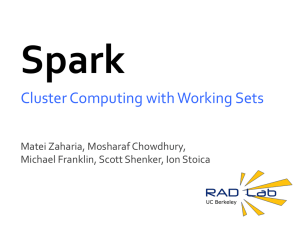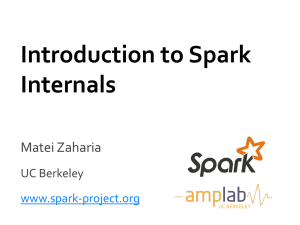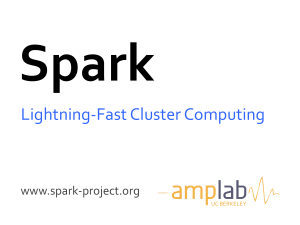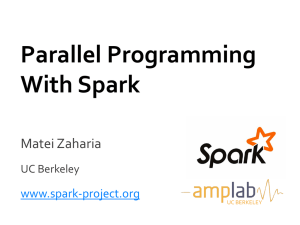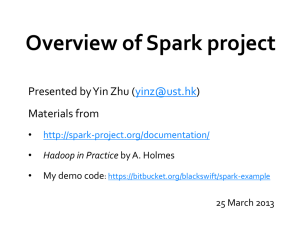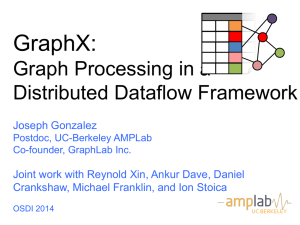Slides PPTX - Spark Summit
advertisement
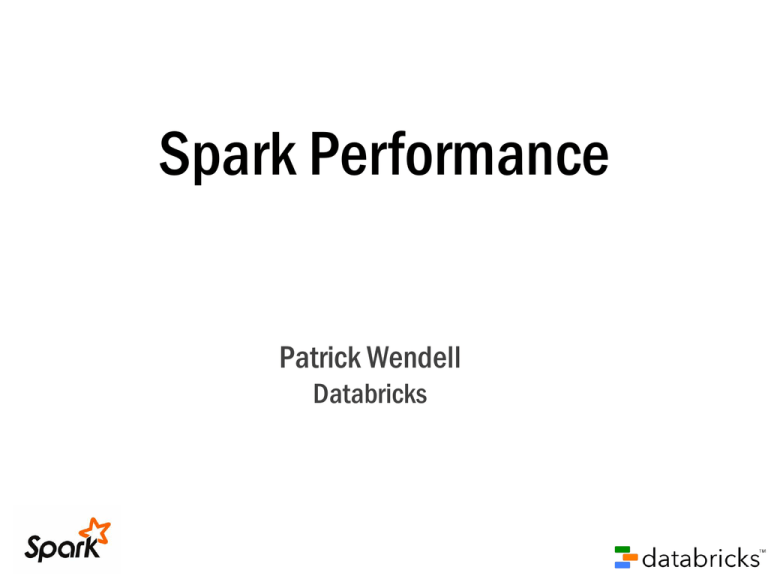
Spark Performance Patrick Wendell Databricks About me Work on performance benchmarking and testing in Spark Co-author of spark-perf Wrote instrumentation/UI components in Spark This talk Geared towards existing users Current as of Spark 0.8.1 Outline Part 1: Spark deep dive Part 2: Overview of UI and instrumentation Part 3: Common performance mistakes Why gain a deeper understanding? (patrick, $24), (matei, $30), (patrick, $1), (aaron, $23), (aaron, $2), (reynold, $10), (aaron, $10)….. spendPerUser = rdd .groupByKey() Copies all .map(lambda pair: sum(pair[1])) data over the .collect() network spendPerUser = rdd .reduceByKey(lambda x, Reduces y: x + y) .collect() locally before shuffling RDD Let’s look under the hood How Spark works RDD: a parallel collection w/ partitions User application creates RDDs, transforms them, and runs actions These result in a DAG of operators DAG is compiled into stages Each stage is executed as a series of tasks Example sc.textFile("/some-hdfs-data") .map(line => line.split("\t")) .map(parts => (parts[0], int(parts[1]))) .reduceByKey(_ + _, 3) .collect() textFile map map reduceByKey RDD[String] RDD[List[String]] RDD[(String, Int)] RDD[(String, Int)] Array[(String, Int)] collect Execution Graph textFile map map reduceByKey Stage 2 Stage 1 textFile map collect map reduceByKey collect Execution Graph Stage 2 Stage 1 textFile read HDFS split apply both maps partial reduce write shuffle data map map Stage 1 reduceByKey Stage 2 collect read shuffle data final reduce send result to driver Stage execution Stage 1 Task 1 Task 2 Task 3 Task 4 Create a task for each partition in the new RDD Serialize task Schedule and ship task to slaves Task execution Fundamental unit of execution in Spark - A. Fetch input from InputFormat or a shuffle B. Execute the task C. Materialize task output as shuffle or driver result Pipelined Execution Fetch input Execute task Write output Spark Executor Core 1 Core 2 Fetch input Fetch input Execute task Execute task Write output Execute task Write output Write output Fetch input Fetch input Execute task Execute task Write output Write output Fetch input Fetch input Core 3 Fetch input Execute task Write output Execute task Write output Summary of Components Tasks: Fundamental unit of work Stage: Set of tasks that run in parallel DAG: Logical graph of RDD operations RDD: Parallel dataset with partitions Demo of perf UI Where can you have problems? 1. Scheduling and launching tasks 2. Execution of tasks 3. Writing data between stages 4. Collecting results 1. Scheduling and launching tasks Serialized task is large due to a closure hash_map = some_massive_hash_map() rdd.map(lambda x: hash_map(x)) .count_by_value() Detecting: Spark will warn you! (starting in 0.9…) Fixing Use broadcast variables for large object Make your large object into an RDD Large number of “empty” tasks due to selective filter rdd = sc.textFile(“s3n://bucket/2013-data”) .map(lambda x: x.split(“\t”)) .filter(lambda parts: parts[0] == “2013-10-17”) .filter(lambda parts: parts[1] == “19:00”) rdd.map(lambda parts: (parts[2], parts[3]).reduceBy… Detecting Many short-lived (< 20ms) tasks Fixing Use `coalesce` or `repartition` operator to shrink RDD number of partitions after filtering: rdd.coalesce(30).map(lambda parts: (parts[2]… 2. Execution of Tasks Tasks with high per-record overhead rdd.map(lambda x: conn = new_mongo_db_cursor() conn.write(str(x)) conn.close()) Detecting: Task run time is high Fixing Use mapPartitions or mapWith (scala) rdd.mapPartitions(lambda records: conn = new_mong_db_cursor() [conn.write(str(x)) for x in records] conn.close()) Skew between tasks Detecting Stage response time dominated by a few slow tasks Fixing Data skew: poor choice of partition key Consider different way of parallelizing the problem Can also use intermediate partial aggregations Worker skew: some executors slow/flakey nodes Set spark.speculation to true Remove flakey/slow nodes over time 3. Writing data between stages Not having enough buffer cache spark writes out shuffle data to OS-buffer cache Detecting tasks spend a lot of time writing shuffle data Fixing if running large shuffles on large heaps, allow several GB for buffer cash rule of thumb, leave 20% of memory free for OS and caches Not setting spark.local.dir spark.local.dir is where shuffle files are written ideally a dedicated disk or set of disks spark.local.dir=/mnt1/spark,/mnt2/spark,/mnt3/spark mount drives with noattime, nodiratime Not setting the number of reducers Default behavior: inherits # of reducers from parent RDD Too many reducers: Task launching overhead becomes an issue (will see many small tasks) Too few reducers: Limits parallelism in cluster 4. Collecting results Collecting massive result sets sc.textFile(“/big/hdfs/file/”).collect() Fixing If processing, push computation into Spark If storing, write directly to parallel storage Advanced Profiling JVM Utilities: jstack <pid> jvm stack trace jmap –histo:live <pid> heap summary System Utilities: dstat io and cpu stats iostat disk stats lsof –p <pid> tracks open files Conclusion Spark 0.8 provides good tools for monitoring performance Understanding Spark concepts provides a major advantage in perf debugging Questions?
